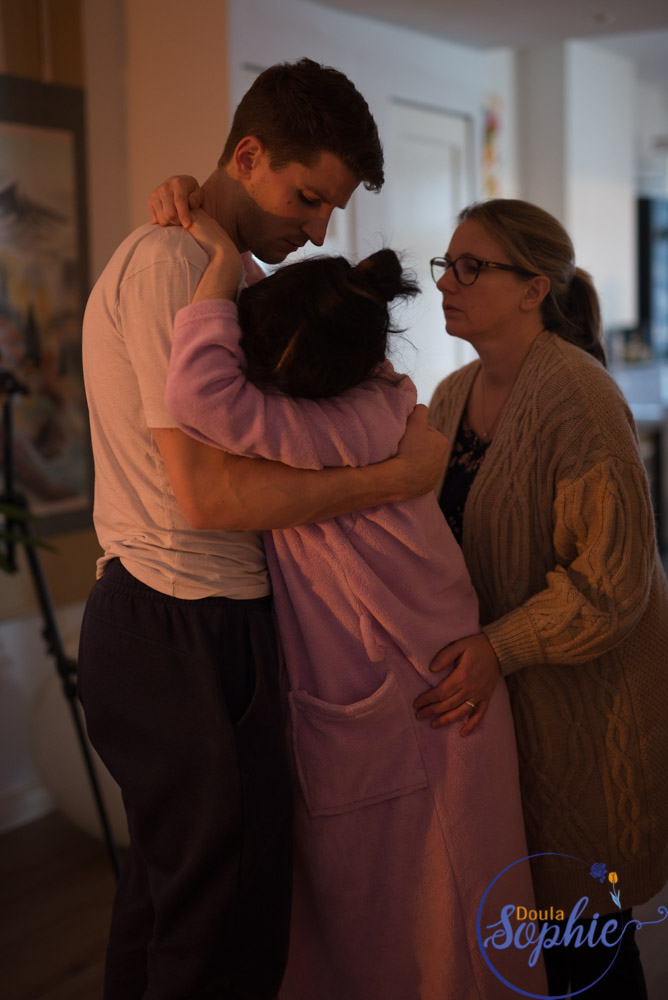
You might think that because you have a midwife you will have continual support during the whole birth proces. Someone who stays with you, encourages you and helps you through the process. And if you are lucky that will be the case. BUT usually this is only from very active labour, and sometimes even then, the midwife is still in and out the room until you are close to pushing. (Plus if you decide you want medicinal pain relief then she will likely not stay with you and the medical staff at the hospital will take over your care.)
If you are counting on continual care from your midwife then you may not consider hiring a doula for labour support. The usual rationale is that you have your midwife and partner for support so a doula is one extra person who may not be necessary. Plus, it’s an added cost in an already expensive time.
What is a doula?
A doula is an emotional, informational and physical support person for both parents during labour and birth. She gets to know you before hand, prepares for the birth with you and is a continuous support person from the time the parents need her to a few hours after the birth of the baby. A doula is trained in childbirth education, comfort measures and massage techniques and works with the partner in reminding them what the mother may need.
What are the benefits of a doula?
Studies show that mothers who have a doula for their birth have more positive experiences and tend to use less pain medications. Also, women are less likely to have cesareans. This is because when a woman feels safe and supported, she can trust the laboring process better and progress more efficiently without needing external interventions.
A doula also helps you prepare before hand so there are less surprises during the birth. She also helps you process the twists and turns in the process as they happen. This makes them less of a deal and helps towards a better experience. You want to be enjoying your newborn in the first week after birth not processing a traumatic birth.
We teach a lot about early labour in our Confident Birth course. Sometimes ‘early labor’ can be a mild and manageable phase when one can simply rest, watch a movie, or bake a cake. BUT some women have early labour patterns that are quite active and painful already. This is when it’s can be amazingly helpful to have a doula. She will come when you need her and stay with you in this phase helping you cope and settle into the contractions despite their increasing strength and frequency.

There is a lot of pressure on the partners these days to be ‘everything’ for the birthing woman. From needing to remember everything from the childbirth education class, be in communication with the midwife or hospital plus meeting his or her own basic needs. When there is a doula, the partner can remain calm and more relaxed, which inevitably will help make the labouring mother feel more at ease too.
As early labor progresses into active labor, there may be signs or symptoms that can be alarming to the inexperienced partner. This includes vomiting, shaking, vaginal bleeding, leaking of fluid, diarrhea, etc. and when a doula is present to reassure that all is well and the changes are normal you are more likely to settle into these changes more easily.
During your pregnancy you can also be referred to the gynaecologist with a complication and need to give birth under their care. This does not mean you will see the gynaecologist during the birth it just means it is safer for you to give birth under their care. You will then still give birth with a clinical midwife or Dr. from the hospital and only see the gynaecologist if there is a complication. Having your own doula in this case is especially beneficial as there is no-one during the process who knows you personally and who you have built a bond with.
Having a doula present can be very beneficial if it has been a long labour and the mother maybe losing motivation and steam. You have prepared together before hand building trust and talking about what might be tools that work in this scenario. Your doula knows how you are wired because she has put in the time with you before hand. A doula is there to encourage you and suggest tips and tricks to help labour along. Also if the partner needs some time or needs to lay down for a bit in order to regain some energy for the rest of the process or for when the baby has arrived, the doula is with the mother and there is more space for this.
The role of the midwife.
The midwife’s role is managing the safety of the mother and baby. While the midwife can suggest the same comfort techniques and activities as a doula, she will not stay with you at home in early labour or in the room with you continuously once you get to the hospital. Even if you have the more continual support of your midwife, when the rubber hits the road, her focus is on the safety of the baby. A doula is the only one in the room who’s sole focus is supporting you!
Where can I find a doula?
So there is a saying that if a doula were a drug then it would be unethical not to use it! I love that and I have to say it is so true. Why wouldn’t you hire a doula?
We would love to make an appointment to talk about how we can support you. We work closely as a team and have packages that include midwifery and doula services together. Our doula’s are ready to meet you.
How much does a doula cost?
Most doulas range from €750-€1800. There are doulas in training who charge a significantly discounted fee.
Leave a Reply